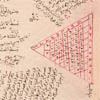The National Library and Archives of Egypt (Dar Al-Kutub) was the first national library in the Middle East. It was established in 1870, due to the suggestion of Refa'a Al-Tahtawi (1801-1872) to buildup a library in Egypt under the supervision of Ali Mubarak. Valuable collections of books and manuscripts were gathered from different sources. A number of geometrical instruments and maps were also included. Dar Al-Kutub was inaugurated to the public on the 24th September 1870 AD.
Collection of Egyptian postcards through various themes such as arts, trades, buildings, places, views and pharaohs.
Postcard holdings of the Diplomatic Archives Centre in Nantes (CADN): postcards from North Africa, mainly Tunisia.
The CD-ROM "The Sana'a Manuscripts" illustrates the evolution of Arabic calligraphy as evident in a set of rare manuscripts that belong to the Yemenite antiquities and manuscripts organization.








